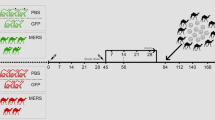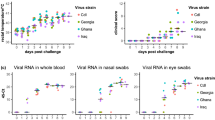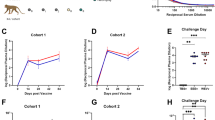Abstract
MAREK'S disease (MD) is a common neoplastic disease of the domestic fowl caused by a herpesvirus (MDV). It is controlled in the field by vaccination with artificially attenuated strains of MDV, or more commonly with the antigenically related herpesvirus of turkeys (HVT)1. The nature of the immune prophylaxis is not clear; protective immunity may be directed against MDV, against the development of tumours, or both. One way in which vaccination may exert its effect is by influencing the spread of MDV within the body2. In contrast, infected birds may occasionally recover after showing signs of MD clinically, and in some birds MD lymphoproliferative lesions regress3, so it is likely that there is also an anti-tumour immune reaction. We have sought evidence for anti-tumour immunity in experimentally immunised birds.
This is a preview of subscription content, access via your institution
Access options
Subscribe to this journal
Receive 51 print issues and online access
$199.00 per year
only $3.90 per issue
Buy this article
- Purchase on Springer Link
- Instant access to full article PDF
Prices may be subject to local taxes which are calculated during checkout
Similar content being viewed by others
References
Biggs, P. M., Br. J. Cancer. 31, Suppl. II, 152–155 (1975).
Jackson, C. A. W., Biggs, P. M., Bell, R. A., Lancaster, R. M., and Milne, B. S., Avian Path., 3, 123–144 (1974).
Sharma, J. M., Witter, R. L., and Burmester, B. R., Infect. Immun., 8, 715–724 (1973).
Powell, P. C., Payne, L. N., Frazier, J. A., and Rennie, M., Nature, 251, 79–80 (1974).
Witter, R. L., Stephens, E. A., Sharma, J. M., and Nazerian, K., J. Immun., 115, 177–183 (1975).
Nazerian, K., and Lee, L. F., J. gen. Virol., 25, 317–321 (1974).
Avrameas, S., and Ternynck, T., Immunochemistry, 6, 53–66 (1969).
Sanderson, C. J., and Frost, P., Nature, 248, 690–691 (1974).
Payne, L. N., Frazier, J. A., and Powell, P. C., in International Review of Experimental Pathology (edit. by Richter, M., and Epstein, M. A.), 16 (Academic, New York, in the press).
Kaaden, O. R., Dietzschold, B., and Ueberschär, S., Med. Microbiol. Immun., 159, 261–269 (1974).
Lesnik, F., and Ross, L. J. N., Int. J. Cancer, 16, 153–163 (1975).
Powell, P. C., Payne, L. N., Frazier, J. A., and Rennie, M., in Proc. Second Int. Symp. Oncogenesis and Herpesviruses, Nuremberg, 1974 (International Agency for Research on Cancer, Lyon, in the press).
Author information
Authors and Affiliations
Rights and permissions
About this article
Cite this article
POWELL, P. Immunity to Marek's disease induced by glutaraldehyde-treated cells of Marek's disease lymphoblastoid cell lines. Nature 257, 684–685 (1975). https://doi.org/10.1038/257684a0
Received:
Accepted:
Issue Date:
DOI: https://doi.org/10.1038/257684a0
This article is cited by
-
Susceptibility of Marek's disease lymphoblastoid cell lines to infection with influenza and pseudorabies viruses and the protective effect of immunization with influenza virus-infected lymphoblastoid cells
Archives of Virology (1982)
-
Antiviral T cell-mediated immunity in Marek's disease
Nature (1977)
Comments
By submitting a comment you agree to abide by our Terms and Community Guidelines. If you find something abusive or that does not comply with our terms or guidelines please flag it as inappropriate.



